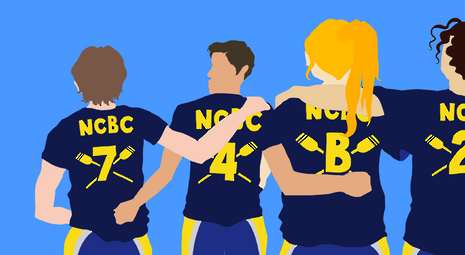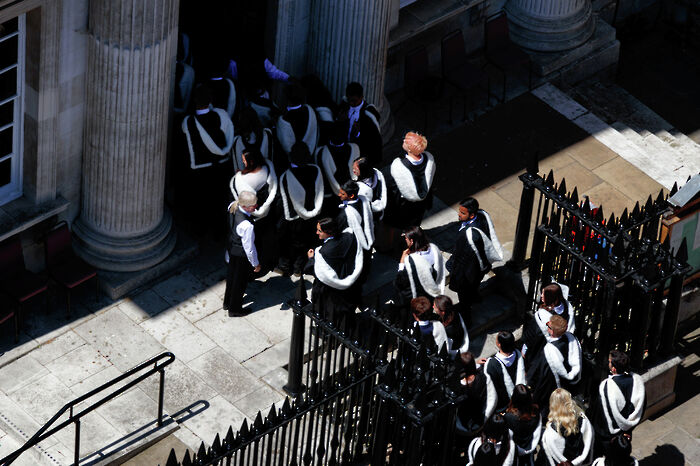Cambridge’s alternative curriculum: the community of sport and the sport of community
In the first of a series of columns reflecting on life outside of the supervision room, Cait Findlay explores how team sports foster a sense of community far greater than the sum of their individual members

Every finalist inherits the intense and crushing awareness of the impermanence of their time at Cambridge and the sheer scale of the future when even three short years here have felt so long. I’ve found myself recently experiencing a kind of pre-emptive nostalgia, wandering through the gardens and corridors or sitting in the library thinking about the good and the bad, the wonderful and the awful moments I’ve lived through in the last three year.
It is inevitable to reflect upon the lessons we have learned, both inside and outside the various supervision rooms, libraries, and lecture halls in which we have performed great – or mediocre – feats of intellectualism and procrastination. So, this column will probably be a fairly self-indulgent process of mapping out what I’ve learned. Not the medieval translations, the glossings of Cymbeline, the dissertations I’ve written on the female grotesque and tensions in Zimbabwean literature (even my examiners, I suspect, did not enjoy reading about those). To wrap up the academic year and chart the mood of nostalgia that builds throughout exam term, for both finalists and younger students facing a long vacation, what better than an alternative curriculum of some lessons to be learned at Cambridge?
What I learned from rowing was that if you show up for other people, you know that they will show up for you
We love to mock rowing: its early hours, near-fanatical personalities, borderline contemptible stash, and euphemistic language (hard strokes, anyone?) beg to be laughed at. And yet there is more to it than the ridiculous all-in-ones and the obnoxiously posed cross-blade photographs that will no doubt flood your social media at the end of each term.
Getting up before the sun rises to cycle across town, sometimes in sub-zero temperatures, whatever the chance of precipitation, is a hard sell. Add to that the prospect of spending several hours outside in a boat either trapped in a queue of hapless novices or being put through your paces by seemingly sadistic but ultimately well-meaning coaches, and it’s a miracle that so many people do it with such commitment and enthusiasm.
Bring your voice — write for Varsity Features
Interested in writing for Varsity’s features section? Join our Facebook group to see our latest commissions, or email our Features team with a 150-word pitch of your article idea.
But what I learned from rowing was that if you show up for other people, you know that they will show up for you. It’s simple social awareness: 6am plus nine other people (seven rowers, a cox, and a coach) plus a two-mile cycle to the boathouse equals an alarm that you cannot snooze. You don’t want to be the person who lets down those nine sleep-deprived people, and the beauty is that no one else wants to be that person either – at least once you’ve made it through the volatility and chaos of novicing. You show up for your crew, your cox, and your coach, and they show up for you.
And showing up means more than literally being present to sit on a wooden seat that leaves you with one cheek numb, though that is important. You also have to show up with the right attitude, a performance of it, or neutral stoic silence. It’s arriving with a smile, a sense of humour, and a willingness to face whatever inclement weather, frustratingly slow boats, or torturous drills might be waiting for you on the water. Meanwhile, you can leave everything else – stress, sleepiness, studies – on the bank when you push off.
It is also the hours and efforts that you all put in individually that no one sees. Maybe it’s setting your alarm ten minutes earlier than strictly necessary, because it takes a little while to shake off the grogginess of sleep; it might be leaving the party early to squeeze in a little more sleep before your wake-up time at ridiculous o’clock; it will definitely be the independent ergs and workouts that you log to make yourselves collectively fitter, stronger, and fiercer competition. It’s committing to the asceticism of drinking bans and training plans.
We had become involved in a labour of love that was somehow much bigger than each individual rower
The epitome of most rowers’ experiences at Cambridge is the slightly mad and questionably safe institution that is Bumps. This requires large-scale commitment: over 1,400 rowers show up for each other to provide competition on the narrow tangled nightmare that is the Cam. Perhaps that’s an overly sentimental way of looking at it. The motivation may well be the bragging rights, greenery, and boozy post-Bumps Boat Club Dinners, rather than dedication to the 6% of fellow students who will race you in a frenzied chase that frequently results in injuries – to boats, if not to boaties – and may leave you with blades of glory or spoons of shame. Nonetheless, every rower, every marshal, every member of each yelling bank party is there to facilitate a fantastic spectacle and the culmination of a term’s work. Remember when dozens of rowers gritted the towpath last year so that Bumps wouldn’t be defeated by the ‘Beast from the East’? That is what it means to show up: putting in your own time and energy to contribute to something bigger from which many people can benefit. The collective enjoyment of both the participants and the viewers indicated that we had become involved in a labour of love that was somehow much bigger than each individual rower.
For me, though, the moment which cemented this lesson came as a result of Lent Bumps this year. I hadn’t rowed at all in third year – a bittersweet decision – and as such I was available to sub into two days of racing with Newnham’s third boat when they needed an extra rower. I had broken up with my then-girlfriend two hours before hopping on my bike to race, still soggy from a lengthy, teary shower. We bumped King’s that day, and nearly caught Murray Edwards in a heartrendingly close race the next.
I didn’t mention the break-up until both races were over and we were preparing to celebrate. The warmth and support the crew gave me was overwhelming, even though I hadn’t given them my 6ams or my energy until those two days that capped off their term of hard work and yellow flags. I showed up for them. And they showed up for me. Ultimately, rowing – and team sports in general – foster a sense of community far greater than the sum of their individual members.
 News / Hundreds of Cambridge academics demand vote on fate of vet course20 February 2026
News / Hundreds of Cambridge academics demand vote on fate of vet course20 February 2026 News / Judge Business School advisor resigns over Epstein and Andrew links18 February 2026
News / Judge Business School advisor resigns over Epstein and Andrew links18 February 2026 News / Petition demands University reverse decision on vegan menu20 February 2026
News / Petition demands University reverse decision on vegan menu20 February 2026 News / CUCA members attend Reform rally in London20 February 2026
News / CUCA members attend Reform rally in London20 February 2026 News / Caius students fail to pass Pride flag proposal20 February 2026
News / Caius students fail to pass Pride flag proposal20 February 2026










